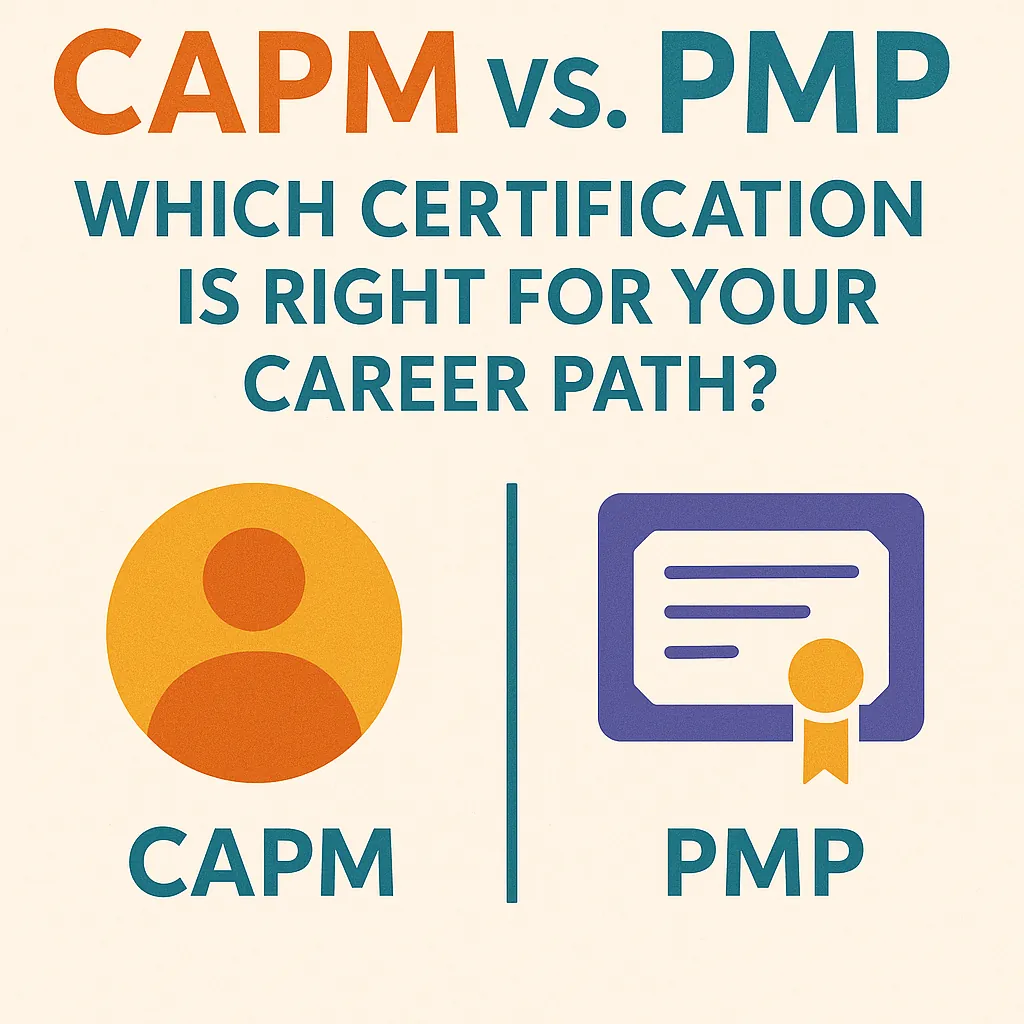Introduction
Project management is a critical discipline that involves planning, executing, and overseeing projects to achieve specific goals within defined constraints such as time, budget, and resources. Its importance spans across various industries, including construction, IT, healthcare, and finance, where effective project management can lead to improved efficiency, reduced costs, and successful project outcomes. As organizations increasingly recognize the value of skilled project managers, the demand for qualified professionals continues to grow.
For those aspiring to enter the field of project management, obtaining relevant certifications can significantly enhance career prospects. Two of the most recognized certifications in this domain are the Certified Associate in Project Management (CAPM) and the Project Management Professional (PMP).
- CAPM is designed for individuals who are new to project management or those looking to establish a foundational understanding of the field. It is an entry-level certification offered by the Project Management Institute (PMI) that provides candidates with a solid grasp of key project management concepts and practices. This certification is particularly beneficial for those seeking roles such as project coordinator, project manager, or associate project manager, as it prepares them for entry-level positions in the industry [1][2].
- PMP, on the other hand, is aimed at experienced project managers who have a proven track record of leading and directing projects. This advanced certification requires candidates to have significant project management experience and is recognized globally as a standard for project management excellence. The PMP certification is often pursued by professionals looking to advance their careers and take on more complex project management roles [12][15].
Overview of CAPM Certification
The Certified Associate in Project Management (CAPM) certification is a valuable credential for aspiring project managers, particularly those seeking entry-level positions in the field. This certification is designed to demonstrate foundational knowledge of project management principles and practices, making it an attractive option for individuals looking to establish their careers in this competitive industry.
Eligibility Requirements for CAPM Certification
To qualify for the CAPM certification, candidates must meet specific educational and training prerequisites:
- Educational Background: A secondary degree (high school diploma or equivalent) is required.
- Project Management Education: Candidates must complete at least 23 hours of project management training or education before sitting for the exam. This requirement ensures that candidates have a basic understanding of project management concepts and methodologies [3][13].
Overview of the CAPM Exam Structure and Content
The CAPM exam is structured to assess a candidate’s knowledge of project management fundamentals. Key aspects of the exam include:
- Format: The exam consists of 150 multiple-choice questions.
- Duration: Candidates have three hours to complete the exam.
- Content Areas: The exam covers various domains, including project initiation, planning, execution, monitoring and controlling, and closing. It also emphasizes the importance of project management processes and knowledge areas as outlined in the PMBOK Guide (Project Management Body of Knowledge) [2][3].
Benefits of Obtaining the CAPM Certification for Entry-Level Job Seekers
Acquiring the CAPM certification offers several advantages for those entering the project management field:
- Enhanced Employability: The CAPM certification signals to employers that candidates possess a foundational understanding of project management principles, making them more competitive in the job market [2][3].
- Career Advancement: Holding a CAPM certification can open doors to entry-level project management positions and provide a pathway for further career development. It demonstrates a commitment to the profession and a willingness to invest in one’s professional growth [2][3].
- Networking Opportunities: CAPM certification holders gain access to a global community of project management professionals, which can be beneficial for networking and mentorship opportunities [2].
Career Opportunities and Job Roles Commonly Associated with CAPM Certification
The CAPM certification can lead to various entry-level job roles in project management, including:
- Project Coordinator: Assists project managers in planning and executing projects, coordinating resources, and tracking project progress.
- Project Assistant: Supports project teams by managing documentation, scheduling meetings, and facilitating communication among stakeholders.
- Junior Project Manager: Takes on more responsibility in managing smaller projects or specific project components under the guidance of a senior project manager [9][10].
Overview of PMP Certification
The Project Management Professional (PMP) certification is a globally recognized credential offered by the Project Management Institute (PMI) that signifies a high level of expertise and experience in project management. It is particularly valuable for those looking to advance their careers in this field. Here are the key points regarding the PMP certification:
Eligibility Requirements
- Experience: To qualify for the PMP certification, candidates must have a minimum of three years of project management experience. This experience should include leading and directing projects, which is a critical component of the certification process [4][6].
- Education: Candidates are required to have a secondary degree (high school diploma, associate’s degree, or global equivalent) along with 7,500 hours of leading and directing projects, or a four-year degree with 4,500 hours of leading and directing projects [4][5].
Exam Structure and Content
- The PMP exam consists of 180 questions that assess a candidate’s knowledge and skills in project management. The questions cover various domains, including initiating, planning, executing, monitoring and controlling, and closing projects [5][6].
- The exam is designed to test not only theoretical knowledge but also practical application, ensuring that candidates can effectively manage projects in real-world scenarios [5].
Benefits of Obtaining PMP Certification
- Career Advancement: Holding a PMP certification can significantly enhance a project manager’s credibility and marketability. It is often associated with higher salaries and more job opportunities compared to non-certified peers [2][3].
- Professional Development: The certification process encourages ongoing professional development, as candidates must stay updated with the latest project management practices and methodologies [2][3].
- Networking Opportunities: PMP certification provides access to a global network of professionals, which can lead to new job opportunities and collaborations [2][3].
Career Opportunities and Job Roles
Many organizations prefer or require PMP certification for project management roles, particularly for senior positions. Common job titles that may require or favor PMP certification include:
- Project Manager
- Program Manager
- Project Director
- Portfolio Manager [2][3][4].
- The certification is particularly beneficial in industries such as IT, construction, healthcare, and finance, where project management skills are in high demand [2][3].
Key Differences Between CAPM and PMP
When considering a career in project management, aspiring project managers often face the decision between obtaining the Certified Associate in Project Management (CAPM) or the Project Management Professional (PMP) certification. Understanding the key differences between these two certifications can help you make an informed choice that aligns with your career goals.
1. Eligibility Requirements
- CAPM: The CAPM certification is designed for entry-level project managers or those looking to start a career in project management. To be eligible, candidates need a secondary degree (high school diploma or equivalent) and must complete 23 hours of project management education before taking the exam [3][6].
- PMP: In contrast, the PMP certification is aimed at experienced project managers. Candidates must have a four-year degree, at least 36 months of leading projects, and 35 hours of project management education. Alternatively, those with a secondary degree need 60 months of leading projects along with the same educational hours [3][14].
2. Exam Structure, Content, and Difficulty Level
- CAPM Exam: The CAPM exam is generally considered less difficult than the PMP exam, making it more accessible for those new to project management. It focuses on fundamental concepts, terminology, and processes outlined in the PMBOK Guide (Project Management Body of Knowledge) [10][14].
- PMP Exam: The PMP exam is more challenging and requires a deeper understanding of project management principles and practices. It tests candidates on their ability to apply knowledge in real-world scenarios, making it suitable for those with significant project management experience [10][14].
3. Recognition and Value in the Job Market
- CAPM Recognition: The CAPM certification is recognized as a foundational credential that demonstrates a commitment to the field of project management. Some employers may prefer or require CAPM certification for entry-level positions, as it indicates a basic understanding of project management principles [7][8].
- PMP Recognition: The PMP certification is highly regarded in the industry and is often a requirement for higher-level project management roles. It signifies that the holder has the expertise and experience necessary to manage complex projects effectively, making it a valuable asset in the job market [7][8].
4. Impact on Salary Potential and Career Growth
- Salary Potential: According to PMI’s salary survey, entry-level project managers with CAPM certification can expect relatively high salaries, but those with PMP certification typically earn about 20% more on average than their CAPM counterparts. This salary difference reflects the advanced skills and experience associated with the PMP certification [1][2].
- Career Growth: Holding a CAPM certification can enhance your resume and open doors to entry-level positions, but pursuing a PMP certification can significantly boost your career trajectory. The demand for project management professionals is expected to grow, with millions of job vacancies anticipated in the coming years, making both certifications valuable for career advancement [11][12].
Which Certification is Right for You?
When it comes to pursuing a career in project management, aspiring professionals often find themselves at a crossroads between two prominent certifications: the Certified Associate in Project Management (CAPM) and the Project Management Professional (PMP). Understanding which certification aligns best with your career goals and current experience is crucial for making an informed decision. Here are some key points to consider:
Identifying Your Career Stage: Entry-Level vs. Experienced
- Entry-Level Candidates: The CAPM certification is specifically designed for individuals who are new to project management. It serves as an excellent starting point for those looking to enter the field without extensive experience. The CAPM validates foundational knowledge of project management principles and processes, making it ideal for recent graduates or those transitioning from other fields [3][12].
- Experienced Professionals: On the other hand, the PMP certification is tailored for those with significant project management experience. To qualify for the PMP, candidates must have a four-year degree, at least three years of project management experience, and 35 hours of project management education [5][10]. This certification is recognized globally and demonstrates a higher level of expertise and leadership in managing projects.
Assessing Your Career Goals: Immediate Job Placement vs. Long-Term Advancement
- Immediate Job Placement: If your primary goal is to secure an entry-level position, such as a project coordinator or junior project manager, the CAPM certification can be a valuable asset. It opens doors to various project management roles and provides a solid foundation for your career [8][12].
- Long-Term Advancement: Conversely, if you are aiming for long-term career growth and leadership roles in project management, the PMP certification may be more suitable. It not only enhances your credibility but also positions you for higher-level opportunities and potentially increased salary [13][14].
Considering the Time and Financial Investment for Each Certification
- CAPM Certification: To obtain the CAPM, candidates need to complete at least 23 hours of project management-focused education, which can often be achieved through online courses or workshops. The exam is less difficult compared to the PMP, making it a more accessible option for those just starting out [7][15].
- PMP Certification: The PMP requires a more substantial investment of time and resources, given the prerequisites and the complexity of the exam. Candidates must prepare thoroughly, often engaging in extensive study and practice to pass the challenging PMP exam [10][15].
Personal Testimonials or Case Studies
- CAPM Success Story: One recent graduate, Sarah, shared her experience of obtaining the CAPM certification. She noted that it helped her land her first job as a project coordinator, where she gained practical experience and built her confidence in managing projects. Sarah emphasized that the CAPM provided her with the foundational knowledge necessary to succeed in her role and set her on a path toward future advancement.
- PMP Journey: In contrast, John, a mid-level project manager, pursued the PMP certification after several years in the field. He found that the PMP not only validated his skills but also significantly enhanced his career prospects. John reported receiving multiple job offers and promotions after earning his PMP, highlighting the certification’s impact on his professional growth.
Tips for Aspiring Project Managers
As you embark on your journey in project management, understanding the distinctions between certifications like the Certified Associate in Project Management (CAPM) and the Project Management Professional (PMP) is crucial. Here are some practical tips to help you navigate your career path effectively:
Resources for Studying for CAPM and PMP Exams
- Study Materials: Choose the right study materials tailored to each certification. For CAPM, consider beginner-friendly resources that cover the fundamentals of project management. For PMP, more advanced materials that delve into complex project management principles are essential. Look for books, online courses, and practice exams that align with the exam structure and content [2][11].
- Study Groups: Joining a study group or finding a study buddy can enhance your learning experience. Collaborating with peers allows for knowledge sharing and can help clarify difficult concepts [2].
Networking Opportunities and Professional Organizations
- Join Professional Organizations: Becoming a member of organizations like the Project Management Institute (PMI) can provide valuable networking opportunities. These organizations often host events, webinars, and workshops that connect you with experienced professionals in the field [15].
- Networking Events: Attend local chapter meetings or industry conferences to meet other project managers. Networking can lead to mentorship opportunities and job referrals, which are invaluable for entry-level positions [15].
Importance of Gaining Practical Experience
- Internships and Volunteer Work: Gaining hands-on experience through internships or volunteer projects is essential. These opportunities not only enhance your resume but also allow you to apply theoretical knowledge in real-world scenarios. Many employers look for candidates who have practical experience in addition to certifications [8][14].
- Project Management Roles: Consider entry-level roles such as project coordinator or assistant project manager. These positions can provide a solid foundation and help you build the necessary skills for more advanced roles in the future [6][13].
Continuing Education and Professional Development
- Ongoing Learning: The field of project management is constantly evolving. Engaging in continuing education through workshops, seminars, and additional certifications (like Agile or Scrum) can keep your skills relevant and competitive [8][15].
- Stay Updated: Follow industry trends and best practices by reading project management blogs, attending webinars, and participating in online forums. This will not only enhance your knowledge but also demonstrate your commitment to professional growth [14].
By focusing on these key areas, aspiring project managers can effectively prepare for a successful career in project management, whether they choose to pursue the CAPM or the more advanced PMP certification.
Conclusion
The choice between the Certified Associate in Project Management (CAPM) and the Project Management Professional (PMP) certifications can significantly influence your career trajectory. Here’s a recap of the main points to consider when making this decision:
- Entry-Level vs. Advanced Certification: The CAPM certification is tailored for those at the beginning of their project management careers, providing foundational knowledge and skills necessary for entry-level roles such as project coordinator or assistant project manager. In contrast, the PMP certification is designed for experienced project managers who have demonstrated their ability to lead and direct projects, requiring prior project management experience [6][10][12].
- Career Aspirations: Aspiring project managers should carefully evaluate their career goals. If you are just starting out and lack significant experience, the CAPM can serve as a stepping stone, allowing you to gain essential knowledge and credibility in the field. On the other hand, if you have the requisite experience and are looking to advance your career, pursuing the PMP may be more beneficial, as it is often recognized as a standard for project management excellence [1][11][14].
- Importance of Both Certifications: Both CAPM and PMP certifications hold significant value in the project management landscape. The CAPM is an excellent entry point for those new to the field, while the PMP is highly regarded among seasoned professionals. Each certification plays a crucial role in enhancing your qualifications and improving your job prospects, making them valuable assets regardless of your current career stage [3][9][13].
Ultimately, the decision between CAPM and PMP should align with your individual career aspirations and current qualifications. By assessing your goals and the requirements of each certification, you can make an informed choice that will set the foundation for a successful career in project management.
Find out more about Shaun Stoltz https://www.shaunstoltz.com/about/.
This post was written by an AI and reviewed/edited by a human.



